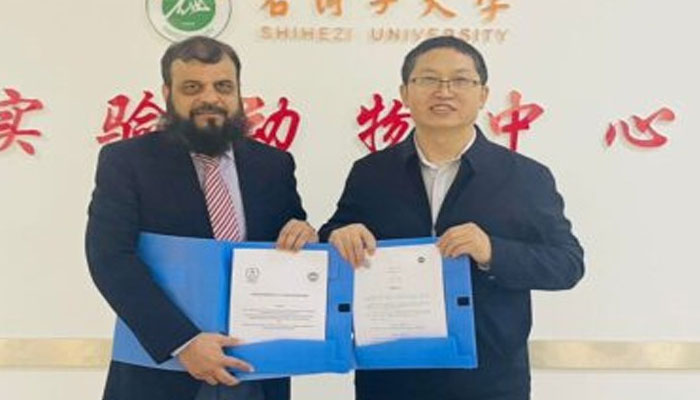Chinese varsity, PU ink MoU on research in health sciences
LAHORE: School of Medicine, Shihezi University, China, and the Centre of Excellence in Molecular Biology (CEMB), University of the Punjab, have signed a Memorandum of Understanding (MoU) to foster collaboration in cutting-edge scientific research and academic exchange, aligning with global advancements in health sciences.
The agreement was signed by Prof Dr Wang Yuanzhi, Vice Dean School of Medicine, Shihezi University, Xinjiang, China and Prof Dr Moaz ur Rahman, Director of the Centre of Excellence in Molecular Biology, University of Punjab, Pakistan, said a press release issued here on Sunday.
This important partnership agreement was facilitated by Prof Dr Cheng, Chairman of the Symposium, and scholar from China Agricultural University, who played a pivotal role in fostering this collaborative agreement.
The Pakistani delegation participated in the International Symposium on Veterinary Vaccine and Drug Technology Cooperation among the Belt and Road Countries. During their visit to Shenzi, this important MoU was signed.
This strategic partnership promotes innovation and collaboration in health sciences by establishing joint research centers, facilitating researcher and student exchanges, and organizing international conferences.
Under the MoU, the two institutions will collaborate on diverse areas, including developing technical research projects, shared academic data and publications, and intellectual property rights.
Both parties are committed to fostering academic exchanges, with joint training programs for students and researchers forming the core of the collaboration. This partnership is a testament to the deepening ties between Pakistan and China in scientific and technological domains.
For China, it reflects an ongoing commitment to fostering collaboration with Belt and Road countries, advancing shared goals in health sciences and technology. The International Symposium, where the agreement was signed, provided a platform for scientists, researchers, and academics from across the globe to converge and share insights. The MoU will remain in effect for five years, with provisions for extension upon mutual consent. Both institutions are optimistic about the long-term benefits of this collaboration, not only for their respective countries but also for the global scientific community.
The signing of this MoU is an important step towards the shared vision of Pakistan and China to harness the power of science and technology for mutual progress and prosperity. It is a beacon for future collaborations within the Belt and Road Initiative, underscoring the importance of innovation and shared growth in shaping a better future.
-
 'Elderly' Nanny Arrested By ICE Outside Employer's Home, Freed After Judge's Order
'Elderly' Nanny Arrested By ICE Outside Employer's Home, Freed After Judge's Order -
 Keke Palmer On Managing Growing Career With 2-year-old Son: 'It's A Lot'
Keke Palmer On Managing Growing Career With 2-year-old Son: 'It's A Lot' -
 Key Details From Germany's Multimillion-euro Heist Revealed
Key Details From Germany's Multimillion-euro Heist Revealed -
 David E. Kelley Breaks Vow To Cast Wife Michelle Pfeiffer In 'Margo's Got Money Troubles'
David E. Kelley Breaks Vow To Cast Wife Michelle Pfeiffer In 'Margo's Got Money Troubles' -
 AI-powered Police Robots To Fight Crime By 2028: Report
AI-powered Police Robots To Fight Crime By 2028: Report -
 Everything We Know About Jessie J's Breast Cancer Journey
Everything We Know About Jessie J's Breast Cancer Journey -
 Winter Olympics 2026: What To Watch In Men’s Hockey Today
Winter Olympics 2026: What To Watch In Men’s Hockey Today -
 Winnie Harlow Breaks Vitiligo Stereotypes: 'I'm Not A Sufferer'
Winnie Harlow Breaks Vitiligo Stereotypes: 'I'm Not A Sufferer' -
 Apple Martin Opens Up About Getting 'crazy' Lip Filler
Apple Martin Opens Up About Getting 'crazy' Lip Filler -
 Why Did OpenAI Remove One Crucial Word From Its Mission Statement?
Why Did OpenAI Remove One Crucial Word From Its Mission Statement? -
 Prince William Warned His Future Reign Will Be Affected By Andrew Scandal
Prince William Warned His Future Reign Will Be Affected By Andrew Scandal -
 Amy Madigan Reflects On Husband Ed Harris' Support After Oscar Nomination
Amy Madigan Reflects On Husband Ed Harris' Support After Oscar Nomination -
 Is Studying Medicine Useless? Elon Musk’s Claim That AI Will Outperform Surgeons Sparks Debate
Is Studying Medicine Useless? Elon Musk’s Claim That AI Will Outperform Surgeons Sparks Debate -
 Margot Robbie Gushes Over 'Wuthering Heights' Director: 'I'd Follow Her Anywhere'
Margot Robbie Gushes Over 'Wuthering Heights' Director: 'I'd Follow Her Anywhere' -
 'The Muppet Show' Star Miss Piggy Gives Fans THIS Advice
'The Muppet Show' Star Miss Piggy Gives Fans THIS Advice -
 Sarah Ferguson Concerned For Princess Eugenie, Beatrice Amid Epstein Scandal
Sarah Ferguson Concerned For Princess Eugenie, Beatrice Amid Epstein Scandal




